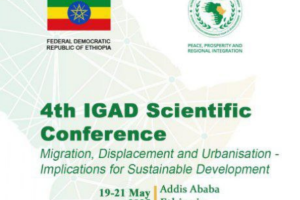
Terrorism poses a grave threat to global security and stability. Its impact reverberates far beyond individual nations affecting regional and international peace. It is for this reason that many argue fighting terrorism necessitates a united front and collective response.
International cooperation is essential in preventing the spread of radical ideologies and dismantling terrorist networks. By sharing intelligence, resources, and expertise, nations can enhance their capabilities to detect and disrupt terrorist plots. Besides, by strengthening border control measures and information sharing mechanisms, countries can impede the movement of terrorists across national boundaries, thereby minimizing their ability to carry out attacks.
The fight against terrorism requires sustained commitment and unwavering determination. It is an ongoing battle that demands long-term cooperation and collaboration among countries, international organizations. The IGAD region is no different. It is crucial for every country in the IGAD region to acknowledge that this issue extends beyond their own borders as terrorism can have widespread consequences.
To combat the global problem, international organizations such as the United Nations, Interpol, and regional bodies like the African Union and the European Union have a vital role to play in coordinating and supporting collective counterterrorism efforts. These organizations can facilitate dialogue, provide technical assistance and mobilize resources to strengthen the capacity of countries in their fight against terrorism.
By pooling their collective strengths, countries can enhance their capabilities in identifying and disrupting potential terrorist threats. Through collaborative efforts, nations can create a united front against terrorism minimizing its impact and preventing its spread across borders.
It is vital to foster international partnerships that promote information sharing and joint coordination in the fight against terrorism. The exchange of intelligence and best practices allows countries to learn from one another’s experiences and successes further strengthening their collective efforts. Furthermore, establishing regional alliances and mechanisms can facilitate collaboration on a broader scale enabling countries to respond effectively to the ever-evolving nature of terrorism.
While countries may face direct consequences, the repercussions of terrorism extend far beyond their borders impacting neighboring nations and the international community as a whole. Recognizing this interconnectedness is paramount in developing a united and comprehensive response strategy. By integrating regional efforts, countries can collectively address the consequences of terrorism and forge a path towards lasting peace and security.
Providing accessible and quality education to all individuals, especially the youth can nurture critical thinking and help mitigate the conditions that contribute to the radicalization process. Collaborative educational initiatives among countries can foster a greater understanding of cultural diversity, promoting empathy and respect among different communities.
Nations must work together to strengthen legal frameworks and improve cross-border cooperation in investigations, prosecutions, and extraditions. Cooperation among nations can facilitate the exchange of knowledge and experiences in implementing effective poverty alleviation programs empowering individuals and communities economically and providing alternative pathways for social and economic development.
By harmonizing laws and procedures and sharing intelligence on terrorist activities, nations can enhance their collective ability to bring terrorists to justice and disrupt their networks effectively. Through collaboration with international entities, nations can benefit from shared expertise, knowledge, and technical assistance, thus enhancing their effectiveness in combating terrorism. Sharing timely and accurate information is crucial in preventing terrorist activities from taking place.
Security agencies and political organizations also play a vital role in combating terrorism. They can facilitate dialogue and cooperation at the policy level coordinating efforts to address the root causes of terrorism and develop comprehensive strategies and initiatives. Through political collaboration, governments can promote legislation that supports counter-terrorism efforts while upholding fundamental human rights principles.
Once a credible threat is identified, it is important to respond promptly and effectively. This requires well-coordinated efforts among security agencies, political organizations, and the legal system ensuring that appropriate actions are taken to mitigate risks while respecting the rights of individuals involved.
The consequences of terrorism can be felt globally, as it poses a threat to international security and stability. Thus, it is important for all countries to understand that combating terrorism is not only in their own interest, but also in the interest of the entire international community.
Throughout the entire process of counter-terrorism, it is vital to uphold and protect human rights. This includes ensuring that individuals suspected of involvement in terrorism are treated fairly and in accordance with the law. By adhering to legal and ethical standards, counter-terrorism efforts can maintain legitimacy and gain the support of the public contributing to its overall success.
Governments must provide regular updates and reports on their counter-terrorism activities and outcomes to ensure transparency and build public trust. Furthermore, mechanisms should be in place to hold accountable those who abuse their powers or violate human rights during counter-terrorism operations.
Continuous training and capacity-building initiatives are necessary for all actors involved in counter-terrorism efforts. Providing relevant education and skill development programs can empower security agencies, political organizations, and the public to better understand and respond to the ever-changing nature of terrorism.
It is also important to acknowledge the importance of international assistance and support in countering terrorism in the Horn of Africa. Developed countries, multilateral organizations, and regional partners can provide technical expertise, financial resources, and capacity-building initiatives to strengthen the capabilities of affected nations. This collaboration can facilitate the transfer of knowledge, resources, and training necessary for effective counter-terrorism efforts.
By promoting understanding, tolerance, and peaceful coexistence, governments can bridge societal divides and promote unity, dismantling the extremist narrative and reducing the appeal of terrorist groups. Combating terrorism in the Horn of Africa requires concerted effort and collaboration among nations and societies worldwide.
The problem of terrorism requires a united and cooperative approach that involves the collaboration of multiple stakeholders. By working together, countries can effectively combat terrorism and foster a more secure and peaceful world for all. A united approach can also address the root causes and underlying factors that contribute to the rise of terrorism. This includes addressing issues such as poverty, inequality, political grievances, and extremist ideologies.
By addressing these root causes collectively, countries can work towards creating a more stable and inclusive society that is less susceptible to the ideologies propagated by terrorist groups.
The Executive Secretary of Intergovernmental Authority on Development (IGAD) called on member states and the international community to scale up their support to fight against terrorism in the Horn of Africa, according to information obtained from Ethiopian News Agency.
It is recalled that addressing the 3rd State of the IGAD Region Session, Workneh Gebeyehu, Executive Secretary said that 2023 is a critical year for the fight against terrorism in Somalia.
The executive secretary underlined the threat of terrorism, though unsuccessful, seeks to weaken the unity of the east African region.
As a result of the threat that has remained in the region, Workneh called on the IGAD member states and the international community to reinforce support in fighting against terrorism particularly, in neutralize Al-Shabab in Somalia.
“2023 is therefore a critical year for the fight against terrorism in Somalia. We call upon IGAD Member States and the international community at large to scale-up support to President Hassan Sheikh Mohamud and the Somali National Security Forces to finally neutralize the group.”
Specifically, IGAD appeals for increased regional, continental and international support for the African Union (AU) Transition Mission in Somalia (ATMIS) which is working together with the Somalia Security Forces, the executive secretary noted.
According to him, this support from partners would have a more lasting and effective remedy to the problem of terrorism in Somalia, with a strong emphasis on the protection of civilians.
IGAD commends the government, security forces and people of Somalia for the recent gains and sustained efforts to counter the influence of the Al-Shabab terrorist group, Workneh added.
Speaking on the political and diplomatic level, Workneh said IGAD shall continue to work with its partners within the quartet framework that convenes IGAD, the AU, the European Union and the United Nations to coordinate joint efforts towards ensuring peace, security and development of member states.
IGAD also takes note of the recent tensions in Laascanood, Somaliland at the end of 2022 which became a matter of concern considering the significant number of civilian deaths and casualties, he pointed out.
BY ADDISALEM MULAT
THE ETHIOPIAN HERALD SATURDAY 25 NOVEMBER 2023




